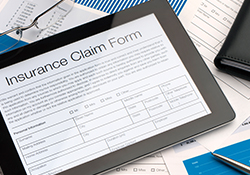Bonus Coverage Coming Your Way

If you’re a policyholder with commercial property insurance, we’re automatically expanding your coverage at no additional charge. It’s part of our ongoing effort to exceed your expectations!
New!
To better protect you and your assets, in addition to the comprehensive coverage you already enjoy as a policyholder, you’re now covered for the following automatically:
- Key and Lock Replacement – Traditional locks are increasingly being replaced by programmable systems, eliminating the need for keys. So we’ve expanded our definition to include coverage for your programmable keying systems should they need to be replaced.
- Crime – When you’re dealing with hundreds or even thousands of monthly rent collections, you may unknowingly deposit counterfeit currency. Our coverage will reimburse you up to $5,000 for forged currency and money orders and up to $5,000 for forged checks.
- Business Personal Property (BPP) – Did you know that your business personal property may not be covered if there’s a loss at your facility? That’s why we’ve added a $25,000 limit per covered location and a $5,000 sublimit for electronic devices, such as laptops and handheld devices. Note that there is a $100,000 aggregate per occurrence, and a $1,000 deductible.
- Business Income (Earnings & Rents) – If your property is damaged due to a covered loss, such as a fire, not only will we cover your loss of rental income, but we’ll also cover your loss of earnings from any services or products you sell. Our coverage is unique in offering up to $25,000 for a loss of both rents and earnings for those scheduled locations affected without a business income limit, subject to a cap of $1,000,000 in any one occurrence.
- Extra Expense – There are always those ‘extras’ that come up when you’re recovering from a loss, such as a fire. You need to find places for your tenants to move, and then you have to pay for those spaces. Extra expense coverage reimburses you for expenses that are necessary to get you back in business, and your tenants back in their units, as quickly as possible.
Traumatic Event Clean-up Endorsement
Unfortunately, people who live in your units occasionally die in your units. Cleanup can be messy—and costly. This new endorsement covers the cleanup expense inside residential units after a traumatic event, including suicide, homicide, body decomposition, mass trauma, or infectious disease.
Tenant Relocation Endorsement
Tenant relocation, such as in the event of a fire, requires major effort—and sometimes major dollars. Our new endorsement covers the expense of:
- Searching for new living quarters
- Renting a room, suite of rooms, or apartment
- Disconnecting and reconnecting household appliances
- Initially transporting tenants and their goods (limit $100 per household)
Contact your account services representative today to learn more.
Introducing Insurity

To better serve you, our valued members, HAI Group continues to improve our systems and has begun transitioning to a new platform for policy administration, billing, and claims.
This change will enable us to better protect your data, provide you with faster service, and launch new products more quickly than ever before.
We will be phasing in this new system to ensure there is no disruption in service. At renewal, you may notice that your policy has a new look; we also encourage you to check the payment address on your invoice, which also has a new look, as the address may have changed. For faster customer service, please have your policy number handy when you call.
We appreciate your patience as we convert to this new system. As always, we’re on hand to answer your questions and address your concerns, and will continue to look for new ways to better serve you.
Join Our First Virtual Conference

Mark your calendar for our first ever virtual conference, “The Virtual Risk Management Event for Housing Organizations,” which will be held Thursday, November 7, 2019. Choose from a variety of interactive risk management sessions and be sure to check out our 3-D exhibit hall featuring select vendors. The best thing about this conference is that there’s no travel required. What’s more, we’ll be sharing session recordings so you can re-watch them at your convenience.
Here are some of the topics we’ll be covering:
- Workplace violence
- Disaster readiness
- Methamphetamines
- Service animals and pet policies
- Insurance coverage gaps
- Much more!
Stay tuned for more information as the conference draws closer.
New Data Available to Help Bolster Your Affordable Housing Investment Strategies

To reinforce your strategic plans and gain new insights into your local housing market, you need to have the latest data at your fingertips. That’s why we’ve updated the Community Reporting Tool for 2019. As an HAI Group member, you enjoy complimentary use of this tool. Use it to:
- Perform a development assessment
- Understand housing needs in your community
- Identify opportunity neighborhoods
- Develop an affordable housing preservation plan
- Cultivate a plan to affirmatively further fair housing
- Much more!
We’ve also added new maps that show opportunity zones and neighborhood opportunity rankings, using data from PAHRC’s Strategies for Investing in Opportunity Report.
If you are new to the Community Reporting Tool or need a refresher, join us for a live webinar on Tuesday, June 26, from 2-3 pm EST. Unable to attend? Register for the tool today and view our video tutorials and user guide.
Save the Date – 2019 HADA Seminar and Outing

The 2019 HADA Seminar and Outing will take place Tuesday, December 10, and Wednesday, December 11, at the JW Marriott New Orleans.
Day one of the seminar will run from 8 a.m. – noon. We’ll provide breakfast and lunch, and you may be able to earn CLE credits for your participation. Later in the day, we hope you’ll join us for dinner and drinks on a scenic riverboat cruise from 6:30 – 9 p.m.
Day two includes continental breakfast starting at 7:30 a.m.; the seminar will resume promptly at 8 a.m. HADA will present a case study with a panel (similar to the 2018 presentation, for those of you who were in attendance last year). Note that CLE credits are not available on day two.
The registration fee is $75 and includes your attendance, possible access to CLE credits, the riverboat cruise reception, and all above-mentioned meals. If you’re a member of HAI Group, we’ll waive your registration fee.
Know a colleague or two who would benefit from the HADA seminar? Contact Patty Emmons to add their names to our contact list.
Stay tuned for more information as the seminar draws closer. We look forward to seeing you in New Orleans!
Training Platform Upgrade

Last month, HTVN, HAI Group’s online training division, updated its learning management system (LMS), with powerful new features based on feedback from our community (that would be you!). The platform has taken a giant leap forward—eight versions—since our last upgrade, and now offers you:
- Personalized course recommendations based on your interests
- Training that runs on any mobile device, so you can learn on the go
- Robust tracking so you know what you (or your team) have completed
- And more!
Log in today to get started. Contact Brian Altshuler, with questions.
What to Consider Before Accepting a Donated Building

As an affordable housing provider, you may be offered a building that your local municipality wants to donate, in some cases so the municipality can receive a tax deduction. Before you accept, there are several important factors to consider.
First, make sure the building will meet your organization’s needs, both now and in the future. If it will, hire a qualified firm to conduct a building inspection, which will uncover adverse conditions, such as aging HVAC systems or mold, which may not be apparent from the property’s exterior. (Since licensing programs vary by state, make sure the building inspector is licensed and certified in accordance with county and state jurisdictions.) The firm you hire should also consult with local building and health department officials to identify potential risks associated with the building.
Pay close attention to any high-risk exposures that are uncovered during the inspection. These include overall poor and depreciating building conditions, structural damage, moisture and mold, lead-based paint, asbestos, defective drywall installed between 2001 and 2009, leaking underground storage tanks, and electrical risks, including aluminum wiring.
In tandem with the building inspection, consider conducting a neighborhood assessment to uncover known or knowable issues, such as crime statistics. Contact your local police department to obtain neighborhood crime reports, or use online resources such as www.crimereports.com.
Other issues uncovered during your due diligence process also merit attention. The following, for example, should raise red flags:
- contractual or commitments to others, such as existing tenants
- liens, including outstanding taxes
- pending or threatened litigation
- violations of federal, state, or local laws
- a historic landmark register or similar designation
Talk to the current building owner and contact the applicable department within your city or town to obtain this information. Use the findings to help you determine whether the property will be a positive contribution to your housing portfolio—or a detriment.
Other Considerations
External Costs. There may be legal and other fees associated with accepting a donated building, such as those associated with environmental cleanup or legal liability. Under the federal Comprehensive Environmental Response, Compensation, and Liability Act (CERCLA), for example, a property owner may be held liable for environmental cleanup, even if the owner was not involved in or did not know of environmental contamination at the property.
Before accepting a building donation, it is critical to establish a baseline of the property’s environmental health before taking title. You can do this by hiring an environmental consultant to conduct a Phase I environmental site assessment. The Phase I, which should comply with ASTM standard E1527 – 13, satisfies CERCLA’s “all appropriate inquiry” requirement and can help the owner qualify for liability protection should the need arise.
Another important consideration is whether the donor has clear title to the property. Your organization can conduct a title search, which can be coupled with the purchase of title insurance through your insurance carrier, to mitigate risk.
Utility Fees. Are there any open or past due water bills or other utility payments associated with the property? Before accepting a donated structure, confirm that you will not be responsible for any remaining utility payments.
Available Resources. It’s important to have adequate resources to maintain the property in question. Adding additional responsibilities to an already understaffed workforce may impact your employees’ ability to do their job and achieve the core mission of your organization.
Contingencies and Stipulations. Are there any contingencies associated with the donation? For example, if a building is being donated by a local city, the city may ask to retain a portion of the building for storage space for a certain amount of time. If so, what type of storage and who would have access to the building? Would this impact your organization’s development plans?
Local Zoning Codes. Development plans may be restricted by local zoning laws. If your organization is planning on refurbishing, remodeling, or renovating the property after the transaction is complete, ensure the future use of the property will not run afoul of local zoning codes.
Insurance Coverage. Depending on conditions and based on an underwriting review, traditional coverage through Housing Authority Property Insurance (HAPI) may not be available for buildings that have been vacant for more than 120 days. After 120 days, coverage may be available through HAI Group’s agency team or through our Housing Specialty Insurance Company, Inc. (HSIC).
Before you add a donated building to your portfolio, contact your account services representative to learn about coverage options.
Did You Know?
If you leave a unit on your property vacant for more than two weeks, you may experience additional risks, such as hidden mold or vandalism. Be prepared by knowing what risks you might face. Contact your insurance representative to learn about coverage options for vacancies.
Claims Reporting Best Practices

According to your insurance policy, how long do you have to report a claim? Do you have seven days? 48 hours?
Most policies require you to report an incident to HAI Group “immediately” or “promptly.” Why? Because late reporting can cost you. Here’s how:
- The expenses you incur prior to reporting are not reimbursable and do not apply toward your deductible (if applicable).
- The longer you wait, the more likely you are to have missing information/evidence and decreased access to witnesses, which can affect your defense.
- Late reporting is a breach of contract and may result in a denial of coverage.
- Additional property damage as a result of a non-reported, non-repaired claim may be denied.
- Damaged resident/employee relationships may result.
- You may experience bad publicity.
Conversely, when you report a claim in a timely manner, you help ensure that facts are preserved, which helps the investigation and allows for the best possible defense. You also reduce uncovered expenses and typically lower the cost of the claim.
To ensure the best possible outcome:
- Report incidents as they occur or as soon as you are notified of an incident or receive notice of a suit.
- Report claims within 24 hours or less if you cannot report them at the time of occurrence.
- 48 hours is the maximum time that should pass before reporting a claim.
- Designate an individual who is responsible for reporting claims and enforcing compliance.
- Designate a back-up for this individual in case they are absent.
- Educate employees about the importance of reporting incidents in a timely manner.
- Ensure that employees are trained on internal accident investigations and the claim reporting process.
- Centralize the reporting process.
- Measure and monitor your timeliness; make changes if necessary.
- Document your actions.
- Report all incidents, even if you don’t think they will become a claim.
- Incidents may be reported as “Notice Only” to ensure that HAI Group has a record of the incident.
- “Notice Only” incidents are not reviewed in the underwriting process.
You can report a claim to HAI Group online at any time using the form on our housingcenter.com website. To report claims after business hours please call 1-800-873-0242, ext. 288.
Customer Satisfaction Survey

How are we doing? Please take a moment to let us know by completing this 30-second survey.


